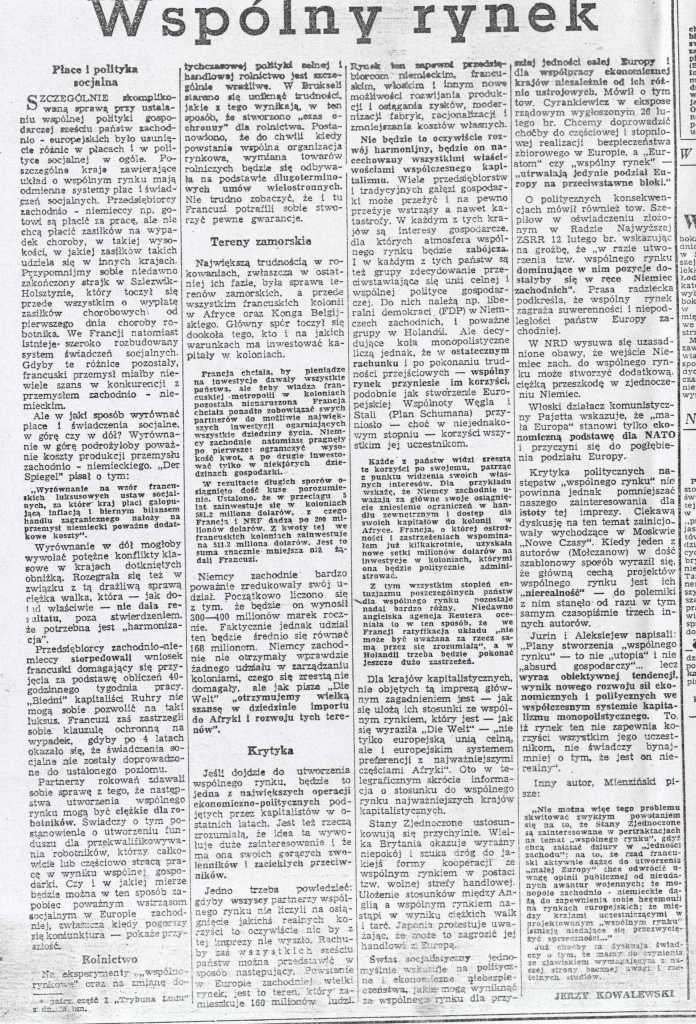| Source | Article from "Trybuna Ludu" |
| Event referred to | Creation of European Community |
| Technological characteristics | Type of file: image
Extension: *.pdf
Dimension: 2 KB |
| Description of the source | Kind of source/: Newspaper article
Origin of the source: Archive
Language: Polish
Copyright issues: full availability
|
| Contextualisation of the source | The article “Common Market” by Jerzy Kowalewski talks about the difficulties the western Europe will have to overcome while establishing the EC. It also mentions other countries’ opinion on the EC. |
| Interpretation of the source | The author is sceptical about the idea of EC. He warns the readership to be cautious about it. Moreover he quotes some opinions of other authors, which are rather negative. Kowalewski claims that the EC won’t bring much benefit neither to western European countries, nor to countries such as Japan and USA. He also says that common market will only increase the division of western and eastern Europe. |
| Original Contents | Artyku³ Jerzego Kowalewskiego pt. „Wspólny rynek” przedstawia drogê szeœciu pañstw zachodnio-europejskich do tytu³owego wspólnego rynku. Oraz pokrótce przedstawia stanowisko pañstw nie objêtych wspóln¹ polityk¹ gospodarcz¹ (m.in. Stanów Zjednoczonych i ZSRR)
Pierwszym powa¿nym problemem tego specyficznego zwi¹zku miêdzy pañstwami by³a znaczna ró¿nica w wysokoœci p³ac i œwiadczeñ socjalnych. Najgorsza sytuacja pod tym wzglêdem by³a w przedsiêbiorstwach zachodnich Niemiec (gdzie nie wyp³acano œwiadczeñ chorobowych), a najkorzystniejsza we Francji. Obserwatorzy z zewn¹trz uwa¿ali, ¿e wspólna gospodarka doprowadzi do silnego wstrz¹su socjalnego w Europie (œwiadczyæ o tym mia³o np. utworzenie funduszu dla przekwalifikowania robotników którzy stracili pracê w wyniku wspólnej gospodarki).
Kolejnym powodem do obaw sta³o siê rolnictwo, a dok³adniej polityka celna i handlowa. Rozwi¹zaniem sta³ siê „czas ochronny” dla rolnictwa – ustalenie o wymianie towarów rolniczych jedynie na podstawie d³ugoterminowych umów wielostronnych.
Jednak najwiêkszy problem stanowi³y ustalenia dotycz¹ce inwestycji w zamorskie kolonie. Ustalono wspólne inwestycje wszystkich pañstw. Niemcy zmniejszy³y swój wk³ad finansowy jednak nie domaga³y siê udzia³u w zarz¹dzaniu koloniami. Niemiecki dziennik „Die Welt” pisa³, i¿ Niemcy otrzyma³y wielk¹ szansê w dziedzinie importu do Afryki oraz w rozwoju tych terenów.
Wspólny rynek by³ jedn¹ z najwiêkszych operacji kapitalistycznych polityczno – ekonomicznych podjêtych w ci¹gu ostatni lat (czasów powstania artyku³u). Wszystkie pañstwa przystêpuj¹ce do wspólnoty mia³y zamiar czerpaæ z niej indywidualne korzyœci. Jednak wiele osób obawia³o siê zachwiania równowagi gospodarczej, oraz zbyt drastycznych zmian. Jednak po sukcesie wspólnoty wêgla i stali obawy zesz³y na drugi plan.
Pañstwa kapitalistyczne nie objête uni¹ obawiaj¹ siê przysz³ych stosunków z powstaj¹c¹ uni¹ celn¹. Stany Zjednoczone patrzy³y przychylnie na owe przedsiêwziêcie, natomiast Wielka Brytania wykazywa³a obawê. Sprzeciwi³a siê Japonia uwa¿aj¹c, ¿e mo¿e to zagroziæ jej handlowi z Europ¹.
Œwiat socjalistyczny widzia³ du¿o politycznych i ekonomicznych niekorzyœci (szczególnie negatywne pog³êbianie podzia³u Europy na dwa bloki). Prasa radziecka podkreœla³a zagro¿enie suwerennoœci i niepodleg³oœci pañstw przystêpuj¹cych do tej wspólnoty gospodarczej. Uwa¿a³a równie¿, i¿ mo¿e to utrudniæ zjednoczenie Niemiec.
Mimo licznych g³osów niechêci i sprzeciwu zainteresowanie wspóln¹ gospodark¹ pañstw zachodnio europejskich by³o du¿e.
|
| Original Contents (English Translation) | The article by Jerzy Kowalewski entitled “The Common Market” presents the way of six West-European states to the title common market. It also briefly presents the stance of states not embraced by the common economic policy (among others, United States and USSR)
The first serious problem of this specific relationship between states was a considerable difference in the level of income and social benefits. The worst situation on that score was in West German firms (where sickness benefits were not paid), and the most profitable in France. Observers from outside believed that the common economy would lead to a strong social shock in Europe (a proof of that e.g. the creation of a fund for the re-education of workers who lost jobs as result of the common economy).
Agriculture became another reason for concern, and more exactly the tariff and commercial policy. “The close-season” for the agriculture was proposed as a solution – a settlement about the exchange of agricultural goods only on the ground of long-term multilateral agreements.
The greatest problem, however, was posed by settlements concerning the investment in overseas territories. Common investments of all states were agreed. Germany limited its financial contribution, however, it did not demand to participate in administering the overseas possessions. The German paper “Die Welt” wrote that Germany was offered a great chance in the field of the importation to Africa and in the development of this area.
The common market was one of the greatest political and economic capitalist operations undertaken in the course of previous years (times when the article was written). All states joining the community hoped to draw individual advantages from it. However, many individuals feared disrupting the economic equilibrium as well as too drastic changes. Nonetheless, after the success of the Coal and Steel Community, doubts receded into the background.
Capitalist countries not included in the union are concerned about future relations with the forming customs union. United States looked favourably at the enterprise, while Great Britain expressed concerns. Japan opposed explaining that this could threaten its trade with Europe.
The socialist world saw a number of political and economic disadvantages (especially the negative deepening of division of Europe in two blocks). The Soviet press underlined the threat to the sovereignty and independence of states acceding to this economic community. It also observed that this can hinder the unification of Germany.
In spite of numerous voices of reluctance and opposition, the interest in the common economy of West European states was noticeable.
|
